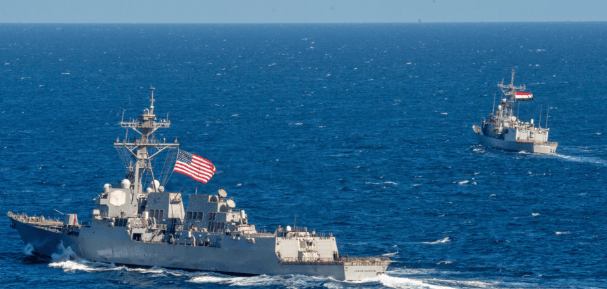Colombia Condemns U.S. Maritime Strikes
Colombia has strongly condemned a new wave of United States airstrikes on boats allegedly involved in drug trafficking off the coasts of South America, calling the operations unlawful and dangerous. Officials in Bogotá urged Washington to immediately stop what they describe as “extrajudicial killings at sea.”
The plea came after U.S. Secretary of Defense Pete Hegseth announced two new airstrikes in the Pacific Ocean — the first of their kind — leaving at least five people dead. According to U.S. military figures, nine such strikes have taken place since early September, killing at least 37 people.
“Colombia calls on the U.S. government to cease these attacks and urges it to respect the norms dictated by international law,” the Colombian Foreign Ministry said in a statement.
President Gustavo Petro went further, calling the campaign “murder.” On social media, he declared: “Whether in the Caribbean or the Pacific, the U.S. government strategy breaks the norms of international law.”
Widening Rift Between Washington and Bogotá
The airstrikes mark a dangerous escalation in what Washington claims is a counter-narcotics operation against international drug cartels. Initially launched on September 2, the campaign targeted vessels linked to criminal organizations in Venezuelan waters.
U.S. President Donald Trump, who authorized the strikes, justified them by declaring that America is in an “armed conflict” with narcotraffickers. Venezuelan President Nicolás Maduro accused Washington of seeking regime change under the pretext of fighting drugs.
As operations expanded into the Pacific and began targeting Colombian boats, regional concern intensified. Analysts warn that the move risks destabilizing relations with long-standing allies and setting off a wave of political backlash across Latin America.
Elizabeth Dickinson, senior analyst at the International Crisis Group, cautioned: “What started as pressure on Venezuela is quickly spreading its tentacles across the rest of the region.”
A Break in a Decades-Long Alliance
The controversy threatens to unravel a strategic partnership that has existed for decades. The United States and Colombia have long cooperated on intelligence sharing and maritime operations to intercept cocaine shipments. In 2023 alone, the U.S. provided over $740 million in aid to Colombia to support anti-narcotics and security efforts.
But relations have soured rapidly. Trump’s recent remarks attacking President Petro personally — calling him a “thug” and “illegal drug trafficker” — were condemned by Colombia as “an insult to diplomacy and to the Colombian people.”
Mexican President Claudia Sheinbaum also weighed in, criticizing the operations as unlawful. “There are international laws on how to operate when dealing with alleged illegal transport of drugs or weapons on international waters,” she said. “We do not agree with these attacks.”
Legal Concerns and Humanitarian Fallout
Experts warn that U.S. military strikes on suspected drug-smuggling boats may violate international maritime law, which limits the use of lethal force to cases of imminent threat. In most cases, such vessels are meant to be intercepted and inspected — not destroyed by airstrikes.
Even if some of the targeted vessels carried contraband, analysts note they were likely operated by low-level traffickers with little influence in global supply chains. “Attacking them would have minimal effect on the actual trafficking of drugs to the United States,” said Dickinson.
One of the victims, Alejandro Carranza, a fisherman from Colombia’s Pacific coast, was reportedly killed in a September attack. His wife, Katerine Hernández, insisted he was innocent: “Why did they just take his life like that? He was only trying to provide for our family.”
The Bigger Picture: A Complex Drug War
The United States continues to grapple with its worst-ever drug crisis, with more than 100,000 overdose deaths annually — most caused by fentanyl and other synthetic opioids produced in China and Mexico. Colombia, while the world’s top producer of cocaine, has no role in fentanyl production.
Cocaine from Colombia typically moves through two main routes:
Pacific corridor: transported to Mexico or Central America and then north to the U.S.
Caribbean route: shipped via smaller boats and fishing vessels toward island chains and Florida.
Analysts say that attacking small boats does little to dismantle the sophisticated cartels that control logistics, shipping, and money laundering.
Escalation Risks and Next Steps
President Trump recently hinted at the possibility of authorizing strikes on land-based targets, arguing that smugglers are shifting to overland routes. “We will hit them very hard when they come in by land,” he said. “They haven’t experienced that yet, but we’re ready.”
Such an expansion could provoke an international crisis, raising questions of sovereignty and legality under the United Nations Charter. Colombia and Mexico are reportedly considering diplomatic measures, including potential formal complaints before international tribunals.
For now, Colombia insists that cooperation must return to a legal framework based on mutual respect and shared responsibility — not unilateral military actions.
Key Takeaways
Colombia Condemns U.S. Strikes: Bogotá calls U.S. attacks on alleged drug-smuggling boats “murder” and demands an immediate halt.
High Casualties: Nine airstrikes since September have killed at least 37 people, including civilians and fishermen.
Legal Concerns: Experts say the operations likely violate international maritime law.
Diplomatic Fallout: Relations between Colombia and the U.S. — once strong allies — are deteriorating rapidly.
Regional Opposition: Mexico and Venezuela join calls for the U.S. to stop the strikes and follow global norms.
Limited Drug Impact: Analysts argue the attacks target low-level traffickers and will not significantly affect global drug routes.
Risk of Escalation: Trump hints at expanding operations to land targets, heightening fears of regional instability.
A W-2, a Laundromat Owner, & a Billionaire Walk Into a Room…
NOVEMBER 2-4 | AUSTIN, TX
At Main Street Over Wall Street 2025, you’ll learn the exact playbook we’ve used to help thousands of “normal” people find, fund, negotiate, and buy profitable businesses that cash flow.
Use code BHP500 to save $500 on your ticket today (this event WILL sell out).
Click here to get your ticket, see the speaker list, schedule, and more.



